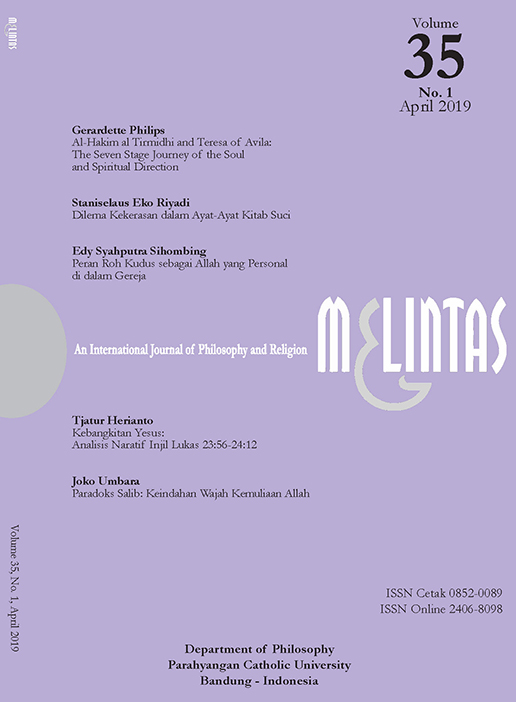Vol. 35 No. 1 (2019)

Why spirituality? Human beings as reflected in their knowledge are a multilayered reality. We cannot ignore some layers of our reality simply because we do not (want to) understand them. When reality is seen as a thing in itself, science as well as philosophy and theology might detach themselves and become ‘neutral’, which, in a sense, are not personal or related to human beings anymore. Spirituality takes everything personal, since each person is related to the reality in ways undreamed-of. There is always a perhaps in our being connected personally to reality.
Our business with this kind of ‘perhaps’ extends towards texts on spirituality and eventually the Scriptures. This edition of Melintas will explore how human beings relate themselves personally to God. The first article explores the theories and insights of the spiritual stage theory from Islam through Sufism using the psychology of Al-Hakim al Tirmidhi and Christianity through Teresa of Avila, and the spiritual direction best suited for spiritual directees at different stages. The second article suggests that violence in the Christian biblical texts must be understood within the context of defining religious identity of a nation among the other nations that have their own gods. Violence in the biblical texts cannot be referred to as a sort of justification for any violent acts by religions in our multireligious and multiethnic society. The third article contemplates the aspects of human personal experience of the Holy Spirit in relation to the theological language of the Persons in Trinity, so that the Christians may discern the presence of the Holy Spirit in their lives. It sees the need of ‘translating’ theological language into comprehensible language of catechism. The fourth article examines the resurrection narrative of Jesus Christ in Luke 23:56-24:12 by revealing its narrative elements and offering day-to-day inspirations that might be beneficial to the Christians. The fifth article contemplates the cross of Jesus Christ in its paradox and how in the light of Balthasar’s theology the cross is seen as the revealing beauty of God’s glory in Christ’s loving gesture towards humanity and the world. From these articles, some layers of our relation to reality emerge not as usual business, but as a spirituality that cannot be unnoticed. Spirituality is always personal.
We need to reconsider the tendency of being ‘neutral’ in philosophising and theologising. In that way, we might forfeit the richness of our personal relations to reality and a deeper knowledge of the self in the presence of The Other.
Editor.

